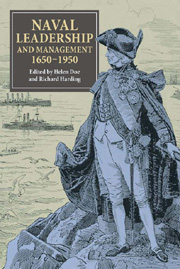Book contents
- Frontmatter
- Contents
- List of Tables
- List of Editors and Contributors
- Acknowledgements
- List of Abbreviations
- Michael Duffy: An Appreciation
- Introduction
- Leadership: The Place of the Hero
- Leadership and Organisational Frictions: Contested Territories
- Management Capability and the Exercise of Naval Power
- The Evolution of Management Training in the Royal Navy, 1800–1950
- 8 New Kinds of Discipline: The Royal Navy in the Second Half of the Nineteenth Century
- 9 Towards a Hierarchy of Management: The Victorian and Edwardian Navy, 1860–1918
- 10 Leadership Training for Midshipmen, c.1919–1939
- Select Bibliography
- Index
10 - Leadership Training for Midshipmen, c.1919–1939
from The Evolution of Management Training in the Royal Navy, 1800–1950
Published online by Cambridge University Press: 05 February 2013
- Frontmatter
- Contents
- List of Tables
- List of Editors and Contributors
- Acknowledgements
- List of Abbreviations
- Michael Duffy: An Appreciation
- Introduction
- Leadership: The Place of the Hero
- Leadership and Organisational Frictions: Contested Territories
- Management Capability and the Exercise of Naval Power
- The Evolution of Management Training in the Royal Navy, 1800–1950
- 8 New Kinds of Discipline: The Royal Navy in the Second Half of the Nineteenth Century
- 9 Towards a Hierarchy of Management: The Victorian and Edwardian Navy, 1860–1918
- 10 Leadership Training for Midshipmen, c.1919–1939
- Select Bibliography
- Index
Summary
The principal aim of the inter-war Royal Navy's officer training systems was to imbue young officers with ‘Officer-Like Qualities’; an undefined although well understood set of values which can be divided into three broad areas; seamanship, leadership and gentlemanliness. Officer-like qualities thus encompassed all the characteristics required in a good naval officer; including courage, determination, honour, social graces and technical knowledge.
The Royal Navy employed a wide variety of officers who entered and were trained in varying ways. Medical officers and chaplains entered the navy as qualified professionals and went through a short course designed to teach them to behave like naval officers. The bulk of naval officers entered the service as executive, engineering or paymaster branch cadets, their training was partly along common lines. A number of men were promoted from the ranks and their training was entirely separate from that of those entering as cadets. In this essay I will concentrate on the training of executive officers entered as cadets.
Young executive officers progressed through several training stages. For most, the first stage was a four-year period at Dartmouth Naval College, entering at the age of thirteen and concentrating on academic knowledge and absorbing naval culture. For the remainder, who entered at seventeen, it was a year aboard a training ship designed to introduce them to naval life and reinforce their academic knowledge. All then went to sea as cadets for eight months, this spell being designed to introduce them to the realities of life at sea and to the men of the fleet.
- Type
- Chapter
- Information
- Naval Leadership and Management, 1650–1950 , pp. 173 - 192Publisher: Boydell & BrewerPrint publication year: 2012



